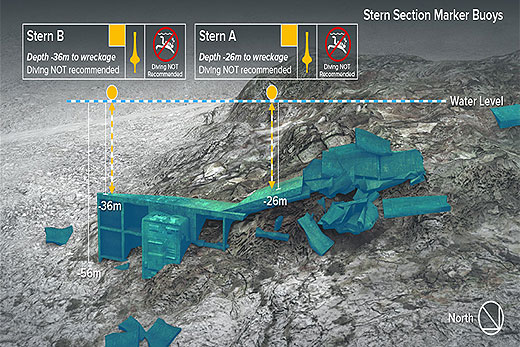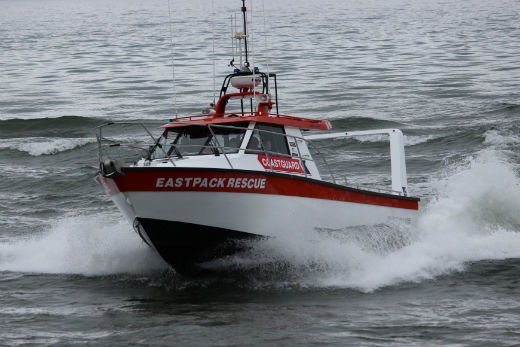Divers and fishers taking the opportunity to be among the first to return to Astrolabe reef in five years will find things have changed.
The exclusion zone, which has been there since the container ship Rena ran aground on October 5, 2011, was lifted on Monday.
Maketu Coastguard's Eastpack Rescue is on station at Astrolabe Reef.
New arrivals on the reef, whether for diving or fishing, will find buoys marking New Zealand's newest wreck dive – and a patrol boat on station.
The Rena owners and insurers have arranged for the Maketu Volunteer Coastguard's Eastpack Rescue to be on station during normal weather conditions at the reef, to keep an eye on things.
Maketu coastguard president Shane Beech says it's mainly about offering advice and information to the divers.
'It's all about being safe, that's the bottom line,” says Shane. 'A lot of our members have already dived the site so they will be able to give good advice as well.”
There is also a new website with information about the new environment on the reef.
For the divers there are a couple of suggested dive trails incorporating wreckage near the top of the reef.
The larger stern section is marked with buoys and warnings. Because of the depth, exploring the stern section is considered too dangerous for recreational divers.

Jared Ross at Tauranga Dive believes Maketu Coastguard volunteers are going to have their hands full.
'There's so much interest in it that every man and his dog is going to want to get out there. If not to get in the water, but just to have a look,” says Jared.
There's a potential for accidents, particularly among divers unfamiliar with the reef, the currents, the swells and the drop off.
'If they haven't been trained, the chances of them going down quite deep are pretty high,” says Jared.
There's one buoy marked at 36m says Jared, but that's the depth to the top of the wreck.
'It goes down another 25 metres after that.”
The risk to divers going too deep and surfacing too quickly, is the bends. There are no facilities in the Bay of Plenty to treat a diver with the bends.
'We are a long way out and it's not likely that recreational divers will take a bottle of oxygen with them,” says Jared.
'If you don't administer oxygen in the first let's say ten minutes, then you are in big trouble. It depends on how bad the bend is. Someone who shoots up from that depth 40m, they are in big trouble.”
The Maketu Volunteer Coastguard's monitoring service is sponsored by the owners and insurers of the MV Rena, as part of the Astrolabe Reef Access Plan to encourage safe and responsible access at the site.
Captain John Owen of The Swedish Club says the owner and insurer are pleased to announce the partnership.
'We expect a large number of visitors to the Reef, which will create a range of competing interests between people wanting to fish and or dive. The Reef Watch (Maketu Coastguard) team will play an important role to monitor activity, and help ensure everyone is encouraged to follow safe and responsible boating practices,” says John.



1 comment
Information Evening?
Posted on 07-04-2016 08:45 | By dbunk
It would be good to have an information evening by one of these organisations who have already dived to school recreational divers up on diving this.
Leave a Comment
You must be logged in to make a comment.